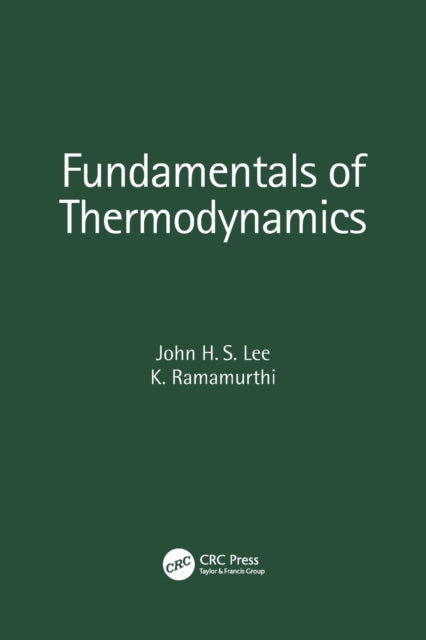John H. S.Lee,K.Ramamurthi
Fundamentals of Thermodynamics
Fundamentals of Thermodynamics
YOU SAVE £2.55
- Condition: Brand new
- UK Delivery times: Usually arrives within 2 - 3 working days
- UK Shipping: Fee starts at £2.39. Subject to product weight & dimension
Bulk ordering. Want 15 or more copies? Get a personalised quote and bigger discounts. Learn more about bulk orders.
Couldn't load pickup availability
- More about Fundamentals of Thermodynamics
Mechanical, thermal, and thermodynamic equilibrium are covered, along with the molecular basis for internal energy, entropy, and reversibility. It demonstrates entropy as a path-independent property and its role in reversibility and other areas.
Format: Paperback / softback
Length: 148 pages
Publication date: 27 January 2022
Publisher: Taylor & Francis Ltd
Mechanical, thermal, and thermodynamic equilibrium are fundamental concepts in physics that govern the behavior of matter and energy. These equilibrium states are achieved when the forces acting on a system are balanced, resulting in a state of stability. Mechanical equilibrium occurs when the net force acting on an object is zero, while thermal equilibrium is achieved when the temperature of a system is uniform. Thermodynamic equilibrium, on the other hand, is a state of balance between heat transfer and work done in a system, ensuring that no net energy is gained or lost.
These equilibrium concepts have numerous applications in various fields, including engineering, chemistry, and biology. In engineering, equilibrium is used to design and optimize systems that operate efficiently and safely. For example, in the design of a heat exchanger, engineers must ensure that the temperatures and pressures on the hot and cold sides of the system are in equilibrium to prevent thermal stress and damage. In chemistry, equilibrium is used to predict the reactions that will occur in a system and to determine the equilibrium constants that govern these reactions. In biology, equilibrium is used to describe the balance of ecosystems, where species interact with each other and their environment to maintain a stable state.
The molecular basis for internal energy, entropy, thermodynamic equilibrium, and reversibility is an essential aspect of these concepts. Internal energy is the energy stored within a system, while entropy is a measure of the disorder or randomness in a system. Thermodynamic equilibrium occurs when the internal energy of a system is equal to the heat transfer and work done to and from the system. Reversibility is the ability of a system to return to its initial state after a change, and it is a key characteristic of a physical process.
Reversible heat engines and reversible heat pumps are examples of systems that demonstrate entropy as a path-independent property. These systems can transfer heat between two states, such as the environment and a reservoir, in a reversible manner, without any net loss of energy. This property is important in many applications, such as gas dynamics, combustion, propulsion, power plant engineering, and engines.
Reversibility from a thermodynamics standpoint is a fundamental concept that relates to the efficiency and sustainability of energy systems. It is important to design and operate energy systems that are as reversible as possible to minimize the waste of energy and reduce the impact of climate change. In addition to its applications in engineering and science, reversibility is also important in everyday life. For example, reversible actions such as recycling and using energy-efficient appliances can help to reduce our environmental impact and save energy.
In conclusion, mechanical, thermal, and thermodynamic equilibrium are fundamental concepts in physics that govern the behavior of matter and energy. These equilibrium states have numerous applications in various fields, and understanding the molecular basis for internal energy, entropy, thermodynamic equilibrium, and reversibility is essential for designing and optimizing systems. Reversibility is a key characteristic of physical processes, and it is important for achieving efficiency and sustainability in energy systems. By promoting reversible actions and technologies, we can work towards a more sustainable and efficient future.
Weight: 264g
Dimension: 233 x 213 x 16 (mm)
ISBN-13: 9781032123004
This item can be found in:
UK and International shipping information
UK and International shipping information
UK Delivery and returns information:
- Delivery within 2 - 3 days when ordering in the UK.
- Shipping fee for UK customers from £2.39. Fully tracked shipping service available.
- Returns policy: Return within 30 days of receipt for full refund.
International deliveries:
Shulph Ink now ships to Australia, Belgium, Canada, France, Germany, Ireland, Italy, India, Luxembourg Saudi Arabia, Singapore, Spain, Netherlands, New Zealand, United Arab Emirates, United States of America.
- Delivery times: within 5 - 10 days for international orders.
- Shipping fee: charges vary for overseas orders. Only tracked services are available for most international orders. Some countries have untracked shipping options.
- Customs charges: If ordering to addresses outside the United Kingdom, you may or may not incur additional customs and duties fees during local delivery.


